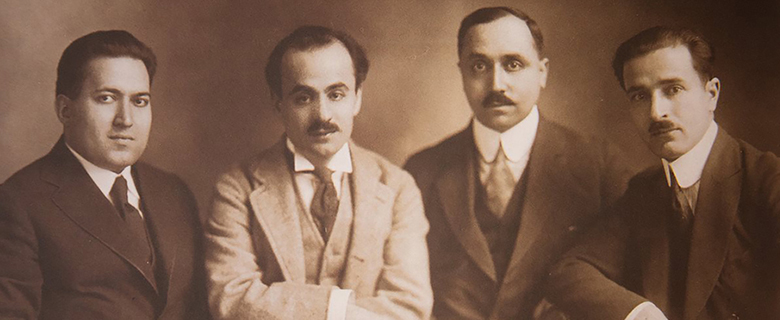
Members of the Pen League
At the end of the 19th century and the beginning of the 20th century, many Arab writers, mostly from Syria and Lebanon, immigrated to North and South America. As these immigrant writers had distinctive poetic and writing characteristics that combined their Arab culture and their life in the diaspora, a literary school known as “Poets of the Diaspora” (Poets of Al-Mahjar) emerged.
Diaspora poets' literary works revolved around topics such as identity struggles, integration into American society, the feeling of separation from Arab culture for subsequent generations born in the United States and the concerns about homeland, among others. Naturally, the diaspora poets were influenced by both Arab and Western literature and arts. They adopted an intellectual and literary orientation that was against everything traditional by shedding poetic restrictions, paying more attention to meaning, and being more liberal in choosing their vocabulary and themes.
Following the Al-Mahjar school, the New York Pen League (in Arabic, Al-Rabitah al-Qalamiyah) was an Arabic-language literary society formed by a number of intellectual elites in 1920. Its prominent members were Gibran Khalil Gibran, Elia Abu Madi, Mikhail Naimy and Abd al-Masih Haddad. The primary goal of this literary society was to promote Arabic language and enrich its literature. The society concerned itself with editing and publishing Arab newspapers in the diaspora, such as Al-Fonoon (The Arts) magazine on literature, Al-Sameer (The Companion) magazine on Arab affairs in America and Al-Saih (The Tourist) newspaper on the affairs of immigrants.
The literary output of the New York Pen League was characterized by contemplating the reality of life and existence and reflecting deeply on human nature and soul. Their writing featured use of simple and easy Arabic language, new poetic forms such as free poetry, new themes stressing the values of love, beauty and goodness, and the employment of symbolic writing. Unfortunately, this school was short-lived and dissolved with the death of one of its pioneers, Gibran Khalil Gibran.
A decade after the Pen League was formed in North America, another literary society emerged in South America, specifically in Brazil, in 1933. It was named the "Andalusian League" after Andalusian literature, which reached high levels of literary art and sophistication, along with the fact that Andalusian poets also lived in a foreign land. A band of writers from the southern diaspora joined under the banner of this league, including Michel Maalouf, Shukr Allah Al-Jar, Rashid Al-Khoury, Elias Farhat, Nazeer Zaitoun, Elias Tohme and others.
This large group of writers organized poetry evenings and exchanged literary work. To publish their work, a group of Arabic newspapers emerged in major Brazilian cities. They also established a literary magazine called Al Osba (The League). Tasking themselves with the responsibility for the Arabic language and restoring the shining glory of Arabic poetry overseas, pioneers of this emerging literary movement were interested in employing their writing to fight for their countries.
Resources in English
The forerunner, his parables and poems by Khalil Gibran
Twenty drawings by Khalil Gibran
Grape leaves: a century of Arab-American poetry Edited by Gregory Orfalea and Sharif Elmusa

Add new comment